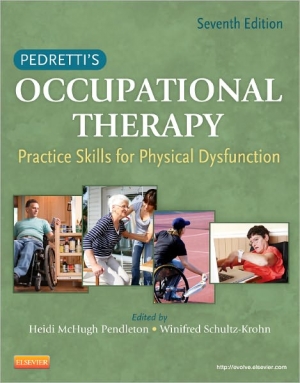
■ Key Features
include the client when making treatment decisions.
professional practice.
for practice, and more to aid your understanding of key concepts.
■ New to This Edition
provide OT services to this unique population.
interventions for TBI problems related to cognitive and visual perception.
■ Author Information
By Heidi McHugh Pendleton, PhD, OTR/L, FAOTA, Professor, Department of Occupational Therapy, San Jose State University,
San Jose, CA, USA and Winifred Schultz-Krohn, PhD, OTR/L, BCP, SWC, FAOTA, Professor, Department of Occupational
Therapy, San Jose State University, San Jose, CA, USA 
Part I: Overview: Occupational Therapy Foundations for Physical Dysfunction
1. The Occupational Therapy Practice Framework and the Practice of Occupational Therapy for Persons with Physical
Disabilities
2. History and Practice Trends in the Treatment of Physical Dysfunction
Part II: Occupational Therapy Process and Practice
3. Application of the Occupational Therapy Practice Framework to Physical Dysfunction
4. Systematic OT Practice: A Model of Evidence-Based Practice for OT
5. Health Promotion and Wellness for People with Physical Disabilities
6. Personal and Social Contexts of Disability: Implications for Occupational Therapists
7. Teaching Activities in Occupational Therapy
8. Documentation of Occupational Therapy Services
9. Infection Control and Safety Issues in the Clinic
Part III: Occupational Performance and the Performance Areas: Evaluation and Intervention
10. Activities of Daily Living
11. Mobility
Section I: Functional Ambulation
Section II: Wheelchairs
Section III: Community Mobility
12. Sexuality and Physical Dysfunction
13. Sleep and Rest
14. Work Evaluation and Work Programs
15. Americans with Disabilities Act and Related Laws that Promote Participation in Work, Leisure, and Activities of
Daily Living
16. Leisure Occupations
17. Assistive Technology
Part IV: Performance Skills and Client Factors: Evaluation and Intervention
18. Performance Skills: Definitions and Evaluation in the Context of the Occupational Therapy Practice Framework
19. Evaluation of Motor Control
20. Occupation-Based Functional Motion Assessment
21. Evaluation of Joint Range of Motion
22. Evaluation of Muscle Strength
23. Evaluation of Sensation and Intervention for Sensory Dysfunction
24. Evaluation and Treatment of Visual Deficits Following Brain Injury
25. Evaluation and Intervention of Perceptual Dysfunction
26. Evaluation and Intervention of Cognitive Dysfunction
27. Eating and Swallowing
28. Evaluation and Pain Management
Part V: The Occupational Therapy Process: Implementation of Intervention
29. Therapeutic Occupations and Modalities
30. Orthotics
Section I: Hand Splinting: Principles, Practice, and Decision Making
Section II: Suspension Arm Devices and Mobile Arm Supports
31. Traditional Sensorimotor Approaches to Intervention
Section I: The Rood Approach: A Reconstruction
Section II: Proprioceptive Neuromuscular Facilitation Approach
32. Motor Learning
Part VI: Intervention Applications
33. Cerebral Vascular Accident/Stroke
34. Traumatic Brain Injury
35. Degenerative Diseases of the Central Nervous System
Section 1: Amyotrophic Lateral Sclerosis
Section 2: Alzheimer's Disease
Section 3: Huntington's Disease
Section 4: Multiple Sclerosis
Section 5: Parkinson's Disease
36. Spinal Cord Injury
37. Neurogenic and Myopathic Dysfunction
38. Arthritis
39. Hand and Upper Extremity Injuries
40. Hip Fractures and Lower Extremity Joint Replacement
41. Low Back Pain
42. Burns and Burn Rehabilitation
43. Amputations and Prosthetics
Section 1: General Considerations of Upper and Lower Extremity Amputations
Section 2: Upper Extremity Amputations
Section 3: Lower Extremity Amputations
44. Cardiac and Pulmonary Diseases
45. Oncology
46. Special Needs of the Older Adult
47. HIV Infection and AIDS
48. Polytrauma and Occupational Therapy


